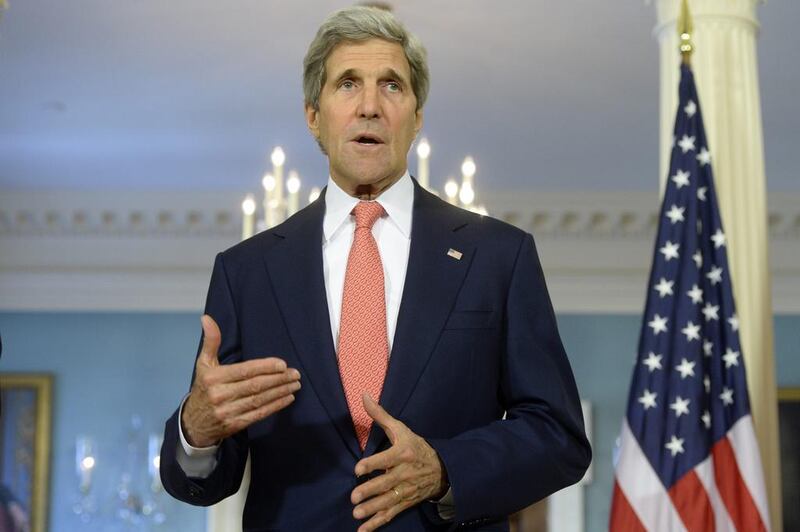Words matter in the Israeli-Palestinian conflict, sometimes even more than actions themselves. In the past few days, senior politicians in the United States and Palestine have used unexpected words, but with sadly predictable results. Is anyone in Tel Aviv listening?
Start with John Kerry who, over the weekend, told a private gathering of world leaders that unless Israel was willing to make peace soon, it risked becoming “an apartheid state”.
Politicos in Tel Aviv and Israel’s supporters in Washington were incensed. The use of the A-word is toxic within Israeli and American political circles, although it is increasingly accepted elsewhere. What was less discussed, however, was why Mr Kerry might be using the word.
The same happened when Mahmoud Abbas called the Holocaust “the most heinous crime” against humanity. Again, Israel’s politicians failed to see the intent behind the words and resorted to attacking the gesture: Israel’s prime minister Benjamin Netanyahu even bizarrely condemned the Palestinian president for his remarks.
What links both Mr Kerry and Mr Abbas’s remarks is a desire to speak over the heads of Israel’s politicians, to Israelis directly.
This generation of Israel’s politicians have become impediments to peace rather than enablers of it. Mr Netanyahu, in particular, is a man of the past. By unilaterally suspending the peace process last week after the Fatah-Hamas reconciliation, he has shown he has no vision for Israel’s future.
Indeed, Mr Netanyahu still speaks as if it were the 1990s. He still excoriates Hamas for failing to recognise Israel, even though the group did that in 1997.
He rails against those Arab countries that continue to sanction Israel for the occupation, when the Arab League has long offered Israel recognition and peace if it would only comply with international law. The Arab Peace Plan, which offers full recognition and normalisation if Israel withdraws to the 1967 borders has been on the table for 14 years, with Israel still unable to say yes.
Even the new breed of Israeli leaders, such as Yair Lapid, the telegenic finance minister, dare not speak out against the political consensus that there is nothing more Israel can do, so powerful is the settler constituency and the security narrative.
This is what Mr Kerry meant when, in the leaked speech, he wondered if a change in leadership might open up the possibility of a real peace process.
If the Israeli public were willing to offer Mr Abbas and Mr Kerry a fair hearing, they might hear the intent behind their words.
By calling the situation in the West Bank “apartheid”, Mr Kerry is seeking to shock Israel out of its complacency. Israeli leaders and their supporters hate the word “apartheid”. It suggests a lack of legitimacy and a historical dark age that Israel fights hard to avoid being seen to recreate.
Yet whatever it is called, the systematic control and oppression of Palestinians in the West Bank by Israel cannot continue. Either these Palestinians are given a state or given the vote.
This binary choice, which is now recognised by the US leadership, is not yet understood by Israel’s politicians. They still appear to labour under the delusion that there is a third way, a way of expanding settlements, continuing to control the lands of Palestine, and still be accepted by the international community. Mr Kerry is trying to signal strongly that the US does not believe this is possible.
In a way, the use of the word apartheid is designed to highlight that words don’t matter as much. Israel remains obsessed with perception, with tweaking what language is acceptable to describe its policies. Witness the furore last month when a senior Republican used the word “occupation”.
The same applies to Mr Abbas invoking the memory of the Holocaust. Palestinians have long been reluctant to magnify the memory of the Holocaust, not because they don’t believe it happened, but because they fear it would reduce their own moral claim of justice for their dispossession.
In the same way that Israelis are unwilling to accept the centrality of the Nakba to the Palestinian narrative, Palestinians have been unwilling to accept the centrality of the Holocaust to the narrative of Israel.
By reaching out in this way to the Israeli public, Mr Abbas is signalling that he, on behalf of the Palestinians, is willing to recognise Israel’s narrative of why their country came to be, even if Palestinians don’t accept that prior suffering justified their own dispossession.
Both Mr Abbas and Mr Kerry are talking over the heads of the politicians. What they are saying is not perfect and many Israelis have long concluded that there is no genuine possibility of a two-state solution. But the words they are saying matter to the future of Israel, to the type of country Israelis will live in.
If the US, which for decades has both financed Israel’s wars and provided the state with political cover, has come to the conclusion Israel’s current leadership are not serious about peace, it is time ordinary Israelis considered the truth in those words and asked themselves where Mr Netanyahu and his policies are leading them.
Ordinary Israelis may hate to hear their country described in such forceful terms. Most will not recognise the description. But sometimes the harshest words come from the truest friends.
falyafai@thenational.ae
On Twitter: @FaisalAlYafai






